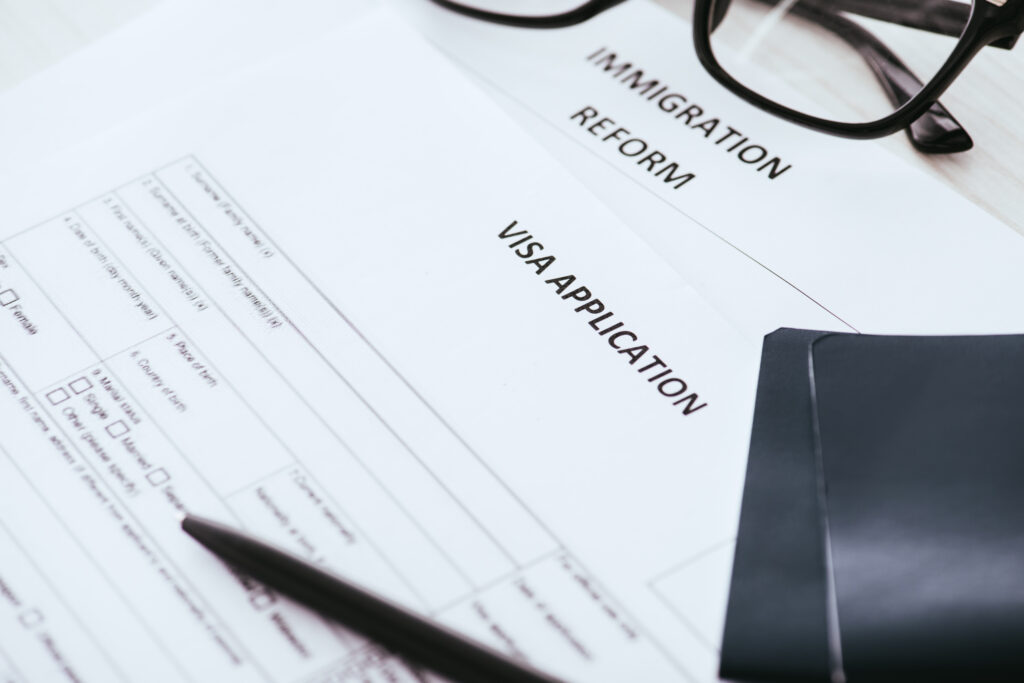Opening a UK bank account as a Skilled Worker Visa holder is one of the most immediate and practical steps every new arrival must take in the UK. As of July 2025, major changes to the Skilled Worker visa rules have come into effect, including a higher salary threshold for most roles and stricter qualification requirements at RQF Level 6 (degree-level equivalent), unless the role falls under the Temporary Shortage List. These updates highlight just how important it is for skilled migrants to ensure smooth financial and administrative integration once they land in the UK.
Opening a UK bank account for migrants in 2025 involves more than simply filling out a form at your local branch. Skilled Worker visa holders must prepare specific documents, understand how credit history can affect applications, and be aware of both traditional and digital banking options now available. At the same time, many newcomers face challenges such as stricter ID checks, limited proof of address, or delays caused by recent regulatory changes.
Why a UK Bank Account is Important for Skilled Worker Visa Holders?
- Receiving Your Salary: Your employer will usually need to pay into a UK bank account. Without one, you may face delays or complications.
- Setting Up Direct Debits and Standing Orders: Rent, Council Tax, utilities, phone contracts, and subscription services in the UK often require regular payments.
- Proof of Financial Stability: Having a UK bank account helps with getting other services, such as a mobile phone contract, and can help with establishing a credit history.
- Convenience: Having a local bank account means less reliance on foreign banks, expensive international transfers, or fintech services with higher fees.
What are the Rules?
Before opening a bank account, you should be aware of how your visa status may affect eligibility. Current rules applicable from 2025 include:
- Most new Skilled Worker visa applicants now must hold RQF Level 6 (degree‐level) qualifications unless working in an occupation on the Temporary Shortage List.
- The minimum salary threshold increased to £41,700 for general roles.
- Transitional protections exist until 22 July 2028 for those already on the Skilled Worker route before the changes.
Having valid Skilled Worker visa documentation (visa/Biometric Residence Permit (BRP), Certificate of Sponsorship (CoS), etc.) will be necessary when opening a UK bank account, to demonstrate your right to reside and work in the UK.
Required Documents and Proofs
When applying for a bank account in the UK as a new skilled worker migrant, banks normally require two main types of documents: one to prove your identity, and one to prove your UK address. Additional documents may also be required. Below are typical requirements:
| Type | What Banks Usually Accept? |
| Proof of Identity (ID) | Passport; Biometric Residence Permit (BRP); UK driving licence; possibly national identity card (if EU/EEA), or other officially recognised government ID. |
| Proof of Address | Utility bills in your name; tenancy or rental agreement; council tax bill; bank statement; UK driving licence showing address; letters from HMRC; employer letter or tenancy correspondence. |
| Visa / Immigration Status Proof | Your Skilled Worker visa or BRP, Certificate of Sponsorship, and any immigration documentation showing your right to reside/work in the UK. |
| Employment & Income Details | Your employment contract, payslips or an offer letter; sometimes proof of income/tax or employer details. This is more likely to be requested in more stringent banks or for certain account types. |
Types of Bank Accounts You Can Open
Here are common types of accounts and what options are available for migrants:
- Basic Current Account: Usually no overdraft, limited fees, suitable for everyday transactions and receiving a salary. Easier to open for beginners.
- Standard Current Account: More features, possibly overdraft options, and more debit card features. May need stronger documentation.
- Digital Banks / Neobanks: Banks or fintechs that are often more flexible with proof of address and credit history. Accounts may be app-based.
- International / Expat Accounts: Some banks (for example, HSBC) offer accounts for non-residents or new arrivals. May allow opening from abroad or before your arrival, though such accounts often have specific requirements (e.g. higher minimum balances, fees).
Step-by-Step Process to Open a UK Bank Account
Below is a typical process many new skilled worker migrants follow to open a UK bank account:
- Choose the right bank or account type
Compare high street banks (HSBC, NatWest, Lloyds, Barclays) versus digital banks/neobanks. Consider fees, branch locations (if needed), online/mobile banking, and whether they accept your visa status and documents. - Gather all required documents
As listed above: passport, BRP, proof of address, employment contract, etc. - Apply online or in-branch
Many banks allow online or app-based applications. Others may require a visit to a branch. Digital banks often provide faster onboarding via app. - Verification checks
The bank will verify your identity, address, immigration status, and sometimes perform credit or anti-money laundering checks. If you have no UK credit history, some banks will still open an account but possibly with fewer features. - Account activation
Once approved, you will receive your sort code, account number, and debit card (usually sent by post). You’ll need to set up online banking and possibly verify additional details.
Credit History, Credit Issues & Alternative Routes
One of the biggest challenges for migrants, including Skilled Worker visa holders, is limited or no UK credit history. This can affect:
- Access to overdrafts
- Getting approved for credit cards
- Other financial products like loans or mortgages
What you can do:
- Begin building credit early by using the account for regular transactions, paying any bills or rent on time (if applicable).
- Use UK alternative financial-identity documentation if available (some banks accept rental agreements or letters confirming address).
- Consider digital banks / neobanks, which may offer more flexible criteria for credit checks.
- Avoid expensive payday lenders or forms of unsecured borrowing with high interest.
Digital Banking Options & Fintech
In 2025, digital banking will be much more mature and will play a big role for migrants:
- Apps like Monese, Starling Bank and Revolut are frequently chosen because they allow fast account opening, lower requirements for proof of address, and strong mobile-first offerings.
- Some banks allow pre-arrival account setup (international or expat accounts), useful if you want banking ready soon after you arrive. However, expect more paperwork and possibly fees.
- Digital banking also helps with budgeting tools, monitoring transactions, notifications, and often lower fees or more favourable international transaction terms.
Common Challenges for New Arrivals in 2025
Even with the information above, migrants often face obstacles. Here are some of the most common, with suggestions for how to overcome them:
| Challenge | Details | How To Address It? |
| Proof of Address | New arrivals often do not have utility bills or bank statements in their name with a UK address. | Use tenancy agreements, a letter from the employer, or bank statements from the previous country rerouted. Some banks accept home-office letters or HMRC correspondence. |
| Visa Identification Timing | You may receive your visa approval or BRP after arriving. Banks often need this document. | Bring all immigration documents; explain the timeline. Some banks allow opening with a visa approval letter plus a follow-up with BRP. |
| Credit History | New skilled workers usually have no UK credit, which limits their options. | Use digital banks, get small UK credit accounts (if possible), pay rent and bills reliably, and apply for a small credit product if eligible. |
| Bank Fees and Eligibility | Some accounts have monthly fees or minimum balance requirements, which can be hard if you’ve just arrived. | Research and compare accounts; choose one with low fees; avoid those requiring high initial deposits. |
| Compliance & Changing Visa Rules | With recent changes to visa rules (e.g. qualification level, salary threshold), banks may request extra proof of employment or status. | Keep all official documents safe, ensure your job contract aligns with your visa, be ready to show the Certificate of Sponsorship or employer details. |
Practical Advice & Checklist
Here is a checklist to make the process smoother:
- Obtain and keep safe: passport, visa/BRP, CoS, employment contract.
- Get a UK address as soon as possible: landlord letter, tenancy agreement or utility bills.
- Apply for a National Insurance (NI) number soon after arrival — not always needed for the bank account, but it helps other services.
- Compare banks for the best current account terms (fees, international services, online banking, etc.).
- Consider digital/neobank options as a fallback if traditional banks pose too many hurdles.
- Keep documentation ready to satisfy anti-money laundering (AML) and Know Your Customer (KYC) requirements.
Final Word!
To open a UK bank account for migrants, especially those on a Skilled Worker Visa, you will need valid identification (passport, BRP, or visa status), proof of UK address, evidence of employment or income, and to manage potential credit history limitations. Digital banking and fintech services now offer flexible alternatives. With the recent changes to visa rules — including higher salary thresholds and stricter skill requirements — banks are carrying out closer checks on job and visa status than before.
While challenges remain in 2025, such as securing proof of address, limited UK credit history, and strict eligibility criteria, being well-prepared makes the process smoother. By gathering the right documents in advance, choosing banks that are more open to migrants, or considering trusted digital banking providers, you can establish your financial footing in the UK quickly and confidently.
For more practical advice and the latest updates on living and working in the UK, be sure to follow Skilled Worker Mag.



